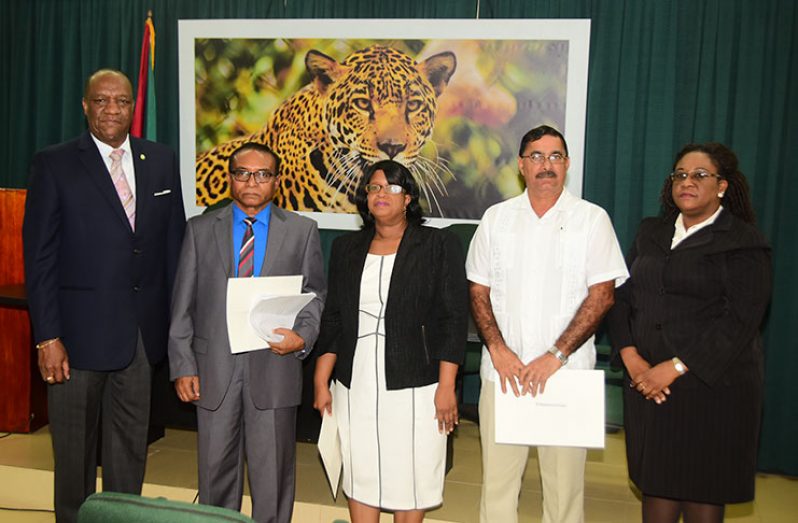CHAIRMAN of the Integrity Commission, Kumar Doraisami and two other members have been sworn-in by Chief Magistrate Ann McLennan after being appointed by President David Granger.
Pandit Rabindranauth Persaud and Rosemary Benjamin-Noble are the two other members who took the oath of office at the Ministry of the Presidency on Thursday. They were presented with their instrument of appointment by Minister of State, Joseph Harmon.
In delivering brief remarks, the Minister of State noted that the Integrity Commission consists of the chairman and three members. He said while one of the members will be sworn in at a later date, the work of the Integrity Commission will go on.
Minister Harmon further pointed out that the Integrity Commission Act provides for the establishment of an Integrity Commission to make provision for the purpose of securing the integrity of persons in public life.
Speaking directly to the newly appointed commissioners, Harmon said the task ahead is not an easy one.
“I wish to remind the new commissioners that your assignment will be especially challenging as you seek to accomplish the aims and requirements of the act and the expectations of our citizens to demand the integrity of persons in public office,” he said.
The appointment was made in accordance with section 3 (4) of the Integrity Commission Act Cap. 19:12 after Opposition Leader Bharrat Jagdeo offered his no objection to the nominees.
Under the Integrity Commission Act, the President is to appoint a chairperson and other commissioners after consultation with the Opposition Leader.
In an interview with reporters shortly after his appointment, the chairman of the Integrity Commission said it will take several months before the commission is fully operationalised.
“I have to get acquainted with them (staff) and I will have to put a programme together so they could work; so it will take a couple months I guess before we can do anything.”
But Doraisami said having conducted his research on the Commission after he was approached by Prime Minister Moses Nagamootoo, believes that he is the man for the job, given his wealth of experience. A former magistrate, Doraisami now engages in private practice.
He said though there is need for the Integrity Commission Act to be further amended, the commission can still enforce the Act.
In June 2017, the Integrity Commission (Amendment of the Code of Conduct) Order 2017 was gazette by Prime Minister Moses Nagamootoo.
In keeping with the 10 Principles of Public Life – accountability, dignity, diligence, duty, honour, integrity, loyalty, objectivity, responsibility and transparency – the order addressed issues of bribes, discrimination, gifts, conflict of interest, use of official influence, handling of classified information, use of public property, sexual misconduct and entertainment.
The expansion of the existing Code of Conduct, the Prime Minister had explained, will bring the Act in line with the legislation governing the State Asset Recovery Unit and the Financial Intelligence Unit (FIU), which states that employees of these state agencies must declare their assets in accordance with the Schedule II of the State Asset Recovery Act.
The Integrity Commission Act was assented to on September 24, 1997.
The Act provides for the appointment of a chairman to head the Commission, not less than two and not more than four other members of the Commission, a secretary to oversee the day-to-day work of the Commission, and other officers for the proper functioning of the Commission.
According to the Act, the chairman is required to be a person who is or was qualified to be a Puisne Judge of the High Court, or any other fit and proper person; and the other members should appear to the President as having experience and showing capacity in law, public administration, social service, finance or accountancy or any other discipline.
Public officers and positions listed under Schedule 1 of the Commission’s Act should disclose their financial assets and liabilities on or before June 30 each year. When a public officer ceases to be a person in public life, he or she should disclose his or her assets and liabilities to the Commission within 30 days from the date that individual cease to be a person in public life, the legislation states.
In the past, the functioning of the Integrity Commission has been a controversial issue, though the previous administration had sworn in members in 1999. That Commission’s Chairman, Bishop Randolph George, resigned in 2006, and has not been replaced to date.




.png)









